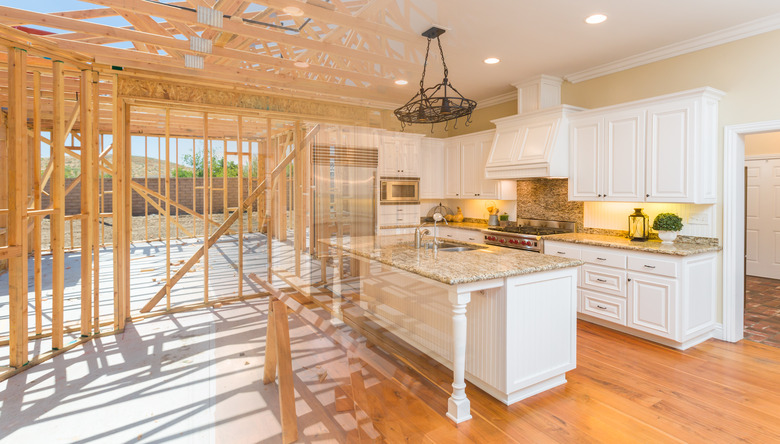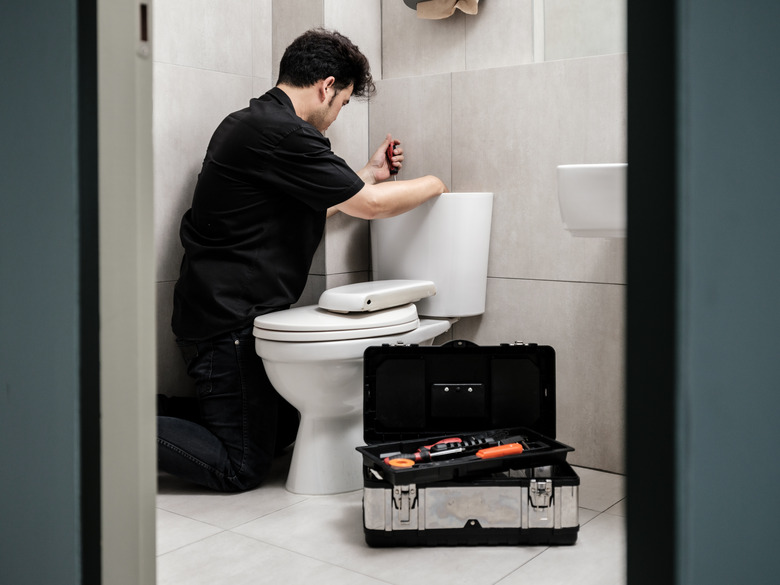8 Things To Do Before You Hire A Contractor For Your Next Home Project
Whether you need an entire kitchen remodeled or you just need to replace your shower tile, it's inevitable that at some point as a homeowner you'll need to hire a professional to help out with a project (or two). But before you start scouring the internet for a general contractor or an electrician, there are a few key things to keep in mind to help you find the right person for the job.
Ready to look for a contractor for your upcoming home project? Here are eight things to know before you hire.
1. Create a Cohesive Plan
1. Create a Cohesive Plan
When homeowners plan renovations or remodeling projects, they often assume they need a general contractor, but some smaller projects only require one or two subcontractors or even just a skilled handyman. That's why it's important to fully plan your project before you start looking for your professional.
The first step of the planning process is to write a project brief detailing exactly what work needs to be done. This will not only be useful for creating a preliminary estimate but will also help you figure out the right type of contractor for your project. It can also lend itself to better communication with prospective contractors during your interviews so they can answer your questions with specific answers rather than generalized ones.
2. Determine Your Contractor Type
2. Determine Your Contractor Type
You will likely need a general contractor if you're doing multiple projects at once or if you're planning a single, major home improvement project that will last several weeks and/or require several kinds of contractors. For example, a big kitchen remodel might require an electrician, a plumber, a flooring specialist, a carpenter, a countertop fabricator, and more. While you can always serve as your own general contractor and oversee multiple subcontractors, it can be quite hectic and confusing, especially if you don't have experience in the construction industry.
However, for smaller projects, working with a general contractor could be overkill. If your kitchen remodel mostly involves small projects, like installing cabinets and repainting the walls, then you may be better off hiring only a carpenter and a painter, not a general contractor. And if your bathroom renovation involves a simple paint job and countertop replacement, a single handyman can probably get the job done.
Even if you do need a general contractor for your project, it's important to recognize that there are many different types out there. Some contractors specialize in commercial buildings, while others focus on residential properties. Some only work on new construction, while others only handle remodels. While some general contractors have all the credentials and experience to handle all of the projects they tackle, others bring in subcontractors to do the more specialized work, like plumbing and electrical. The one thing that all general contractors have in common is that they oversee the entire project, including getting the materials, providing the equipment, hiring and paying subcontractors, pulling the necessary building permits, and ensuring the work is completed properly.
3. Create a Preliminary Project Estimate
3. Create a Preliminary Project Estimate
While you won't have a full understanding of how much your project will cost until you get bids from contractors, you should have some general idea about how much the project will cost before you begin collecting bids. Start by looking up average costs for the project you're planning, taking note of both the high and low estimates as well as the average prices.
Keep in mind that costs may vary dramatically based on your location, contractor, materials, and unpredictable factors, such as inflation or material shortages. When calculating a project's total budget, don't forget to include the building permit fees, which could range from $50 to more than $2,000 depending on the scope of your project and your location, though some minor renovations may not require a permit at all.
4. Create a List of Potential Contractors
4. Create a List of Potential Contractors
Once you have a plan and a budget, it's time to start researching local contractors who could potentially handle your project. Ask friends, neighbors, or family members who have had similar work done if they have any recommendations on who to work with. Word of mouth is a powerful tool. Then, head to the internet to look for websites of professionals near you. A good place to look for contractors for specific home projects is the National Association of the Remodeling Industry, which allows you to search by location and remodeler specialty.
You can also use review sites to search for a contractor. And if you found someone to hire through word of mouth or from their website, cross check with these review sites to make sure they have plenty of positive reviews from happy customers. Remember that a negative review shouldn't necessarily disqualify a company unless the claims are particularly egregious or seem to be issues encountered by multiple customers. Take everything with a grain of salt, but err on the side of the caution and use your best judgment.
5. Review the Contractor’s Credentials
5. Review the Contractor's Credentials
Never work with a contractor who does not have the required qualifications for the job, or you may find that your finished project doesn't meet local building codes. Start by researching what type of insurance, certifications, and licenses your local authority requires a contractor to have in order to complete the particular type of work you need completed. Requirements vary from state to state and city to city, so check what yours requires for specifics.
Most consumer protection agency websites enable homeowners to search for a company's contractor's license, certifications, workers' compensation insurance, bonding information, and more. If you can't find a company by name, most companies will gladly give you its license number so you can look up its license online.
If a company does not want to provide you with its license number, that's a major red flag — take them off your list of prospective contractors immediately. If you can't find evidence that a company has all the necessary qualifications to handle your type of project, ask them to provide proof of these requirements. Also be sure to review the company's Better Business Bureau profile to confirm that it has a good rating and no serious outstanding customer complaints.
Once you have a short list of contractors who clear your initial background check, call them to schedule interviews and send over the project brief prior to the interview. Get itemized bids from multiple contractors (try for at least three) for each specialty you require to ensure you'll get a good balance of quality and value. If you work with a general contractor, they will hire any subcontractors on your behalf.
6. Interview the Potential Contractors
6. Interview the Potential Contractors
Before requesting a bid from any contractor, spend some time interviewing them. Keep in mind that a general contractor could be in your home for a month or more, so even if a contractor's work is fantastic, if you can't stand talking to the person in charge, you might want to look elsewhere.
So, what should you ask? Here's a sampling of what you should find out from any potential hire:
Documentation
Start by asking to see copies of any insurance documents, licenses, or certifications for which you couldn't find records online.
Experience
Ask about their specific experience handling a project of this nature. Also ask for references and see if there are any photos of their related past projects.
Scope
Try to get an idea of the overall scope of the work. For example, if you're working with a general contractor, check if they will pull the required permits, schedule necessary inspections, and hire any subcontractors (if so, ask if these subcontractors will be covered by the general contractor's insurance).
Estimate and timeline
Even if the contractor hasn't yet completed the itemized bid, they should be able to offer a generalized estimate of what the project will cost based on your brief. Similarly, they should be able to provide you with some idea of how long the project might take.
Change orders
It's common for things to not go as planned — so it's important to know the process for change orders, which are what contractors use to get approval when they need to charge for something that didn't appear on the bid or when you want to make changes to the plan.
Payment schedule
A good contractor will never ask you to pay in full up front or accept only cash. You should find out how much your down payment will be, how much you'll need to pay during the project and at what milestones, and how soon after the completion date the final payment is due.
Payment methods
Make sure you familiarize yourself with the company's payment methods so you know if you can pay with a credit card or if it only accepts checks.
Warranty
Most contractors offer some type of warranty on services or materials, but it's good to have this information when comparing different companies.
As for the actual day-to-day aspects of the project, be sure to ask:
- Who is your designated contact and
how can I contact them? - What do I need to do
before the project starts? - What time will the crew show up and
when will they leave? - Do I need to be at the job site in person at any point?
- Will it be too loud or too dusty to continue to stay at home during the project?
- What steps will the team take to clean up at the end of the day?
- Where will tools and materials be
stored overnight? - How will my property be protected
during the project?
Remember to notify the contractor about anything unique about the project or your neighborhood, like a lack of street parking. Be sure to also clarify what restrooms the employees can use during the day and who, if anyone, will be home while the work is completed, including any pets. While you'll probably ask most of the questions during the interview, be prepared to answer any of the contractor's questions as well.
7. Verify References and Compare Bids
7. Verify References and Compare Bids
Before reviewing bids, verify each contractor's references to make sure they are as reliable as they claim to be. Assuming everyone has passed the prescreening process, it's time to review the bids. If one company's bid is dramatically lower than the others, verify the itemized line items to make sure it hasn't left out part of the project.
Keep in mind that price isn't everything. If one contractor has a better portfolio and made you feel more comfortable during your interview, they might be worth a higher cost. Some contractors may be willing to negotiate a little, so if the company with which you most want to work is a little out of your price range, you may see if it will be willing to price match or work with you to lower the overall costs.
8. Review the Contract Thoroughly
8. Review the Contract Thoroughly
Once you've chosen a contractor, be prepared to sign a contract. This will protect both of you in case things go wrong. Always make sure to read the contract carefully prior to signing to ensure it covers:
- The entire project brief
- An itemized cost breakdown
- The rights and responsibilities of
all parties - The project completion date
- What circumstances will result in
the contractor needing to stop work - Dispute resolution terms, including under
what circumstances you can withhold payment - The change order process
- Warranty specifics
- Limitations on damages and liability



